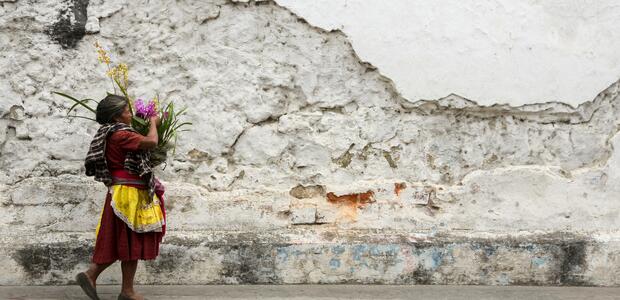Working Paper
The long(er)-term impacts of Chile Solidario on human capital and labour income
This paper examines Chile Solidario, a social protection programme that provides poor households in Chile with preferential access to a conditional cash transfer programme designed to facilitate investments in children’s health and education. We...
Research uptake
The New Policy Model, Inequality and Poverty in Latin America: Evidence from the Last Decade and Prospects for the Future
Latin America has been traditionally a continent of high inequality, in both income and wealth, fundamentally reflecting a skewed distribution of productive assets. High social stratification benefits the personal wealth, power and status of national elites, and is further sustained by their allies. But such stratification imposes social costs that cannot be borne in the long run, not least a distorted development pattern with limited or no poverty reduction.
The Income Distribution in Latin America (IDLA) Dataset
The dataset on Income Distribution in Latin America (IDLA) has been developed in the context of the UNU – WIDER’s Research Project on “The New Policy Model, Inequality and Poverty in Latin America: Evidence from the Last Decade and Prospects for the Future” coordinated by Giovanni Andrea Cornia.
News
TWFR Article: Falling Inequality in Latin America - Policy Changes and lessons
The World Financial Review featured the article Inequality Trends and Their Determinants: Latin America over the Period 1990–2010 based on the UNU-WIDER research project The New Policy Model, Inequality and Poverty in Latin America: Evidence from the Last Decade and Prospects for the Future, and the recently published UNU-WIDER book edited by Giovanni Andrea Cornia.
Project
The growth-employment-poverty nexus in Latin America in the 2000s
Theme: 2014-15
Latin America in the 2000s witnessed an unprecedented period of growth with poverty and inequality reduction. Latin America also suffered from the economic crises in Europe and the United States from 2007/08 onwards. The questions asked in this...
Annual Lecture
 WIDER Annual Lecture 23 - Informality: addressing the Achilles heel of social protection in Latin America
WIDER Annual Lecture 23 - Informality: addressing the Achilles heel of social protection in Latin America
Wed, 30 October 2019
The Graduate Institute of International and Development Studies,
Maison de la Paix, Chemin Eugène-Rigot 2,
Geneva,
Switzerland
Past event
Journal Article
Motherhood and flexible jobs
Part of Journal Special Issue
Women’s Work
Report
Nicaragua: desk study on aid and democracy
This study is part of a series of ten country-focused desk studies on aid and democracy prepared under the project The state and statebuilding in the Global South. They are prepared under the guidance of Rachel M. Gisselquist as background to a...
Journal Article
Does connectivity reduce gender gaps in off-farm employment?
Gender gaps in labor force participation in developing countries persist despite income growth or structural change. We assess this persistence across economic geographies within countries, focusing on youth employment in off-farm wage jobs. We...
Blog
SOUTHMOD family extended: Welcome to the three new Latin American teams
How would progressive income taxation affect income inequality in Bolivia? What are the costs and benefits of implementing a state pension in Colombia...
Working Paper
The role of tax–benefit systems in protecting household incomes in Latin America during the COVID-19 pandemic
The COVID-19 pandemic drastically affected household incomes around the world. In developed economies, pre-pandemic tax–benefit policies and emergency transfers mitigated to a large extent the negative income shock. However, less is known about the...
Working Paper
Inequality of opportunity and intergenerational persistence in Latin America
How strong is the transmission of socio-economic status across generations in Latin America? To answer this question, we first review the empirical literature on intergenerational mobility and inequality of opportunity for the region, summarizing...
Working Paper
Informality, labour transitions, and the livelihoods of workers in Latin America
This paper studies the incidence and heterogeneity of labour informality in six Latin American countries—Argentina, Brazil, Ecuador, Mexico, Paraguay, and Peru. We divide workers into five work statuses: formal wage-employed, formal self-employed...

 Join the network
Join the network




